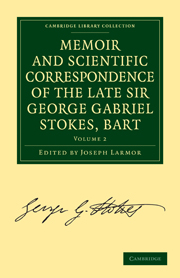 Memoir and Scientific Correspondence of the Late Sir George Gabriel Stokes, Bart.
Memoir and Scientific Correspondence of the Late Sir George Gabriel Stokes, Bart. Book contents
- Frontmatter
- Contents
- Section III SPECIAL SCIENTIFIC CORRESPONDENCE
- JAMES CLERK MAXWELL
- JAMES PRESCOTT JOULE
- WILHELM v. HAIDINGER
- JULIUS ROBERT PLÜCKER
- THOMAS GRAHAM
- Lord AVEBURY
- Sir HENRY E. ROSCOE
- Rev. W. V. VERNON HARCOURT
- Lord RAYLEIGH
- THOMAS ANDREWS
- PETER GUTHRIE TAIT
- Observations of Waves and Swells at Sea
- Sir GEORGE BIDDELL AIRY
- Sir WILLIAM H. M. CHRISTIE
- Extracts from Minutes and Reports of the Meteorological Council
- Pendulums and Gravity Surveys
- CHARLES VERNON BOYS
- Sir WILLIAM CROOKES
- SILVANUS P. THOMPSON
- Index to Vol. II
JULIUS ROBERT PLÜCKER
Published online by Cambridge University Press: 05 October 2010
- Frontmatter
- Contents
- Section III SPECIAL SCIENTIFIC CORRESPONDENCE
- JAMES CLERK MAXWELL
- JAMES PRESCOTT JOULE
- WILHELM v. HAIDINGER
- JULIUS ROBERT PLÜCKER
- THOMAS GRAHAM
- Lord AVEBURY
- Sir HENRY E. ROSCOE
- Rev. W. V. VERNON HARCOURT
- Lord RAYLEIGH
- THOMAS ANDREWS
- PETER GUTHRIE TAIT
- Observations of Waves and Swells at Sea
- Sir GEORGE BIDDELL AIRY
- Sir WILLIAM H. M. CHRISTIE
- Extracts from Minutes and Reports of the Meteorological Council
- Pendulums and Gravity Surveys
- CHARLES VERNON BOYS
- Sir WILLIAM CROOKES
- SILVANUS P. THOMPSON
- Index to Vol. II
Summary
The following statement was made by General Sabine, President of the Royal Society, at the Anniversary Meeting, Nov. 30, 1866, in transmitting the Copley Medal to Professor Plücker.
To an audience not exclusively mathematical it is obviously impossible to enter into details of researches which deal with geometrical questions of no ordinary difficulty. Amongst these, however, may be indicated, as especially appreciated by those who are interested in the progress of analytical geometry, his theory of the singularities of plane curves as developed in the “Algebräische Curven,” with its six equations connecting them with the order of the curves: the papers on point and line coordinates, and on the general use of symbols, may also be noticed as establishing his claim to a position in the department of abstract science which is attained by few even of those who give to it their undivided attention. But Professor Plücker has high merits in two other widely different fields of research, viz. in Magnetism and Spectrology: and to these I may more freely invite your attention.
Shortly after Faraday's discovery of the sensibility of bodies generally to the action of a magnet, and of diamagnetism, Professor Plücker, in repeating some of Faraday's experiments, was led to the discovery of magnecrystallic action,—that is, that a crystallized body behaves differently in the magnetic field according to the orientation of certain directions in the crystal.
- Type
- Chapter
- Information
- Memoir and Scientific Correspondence of the Late Sir George Gabriel Stokes, Bart.Selected and Arranged by Joseph Larmor, pp. 61 - 72Publisher: Cambridge University PressPrint publication year: 2010First published in: 1907


